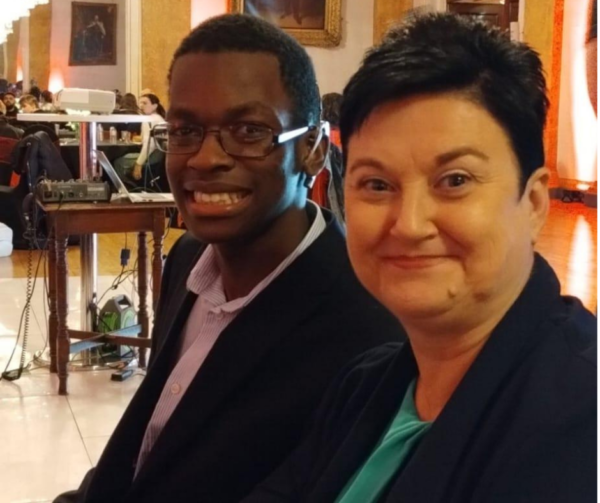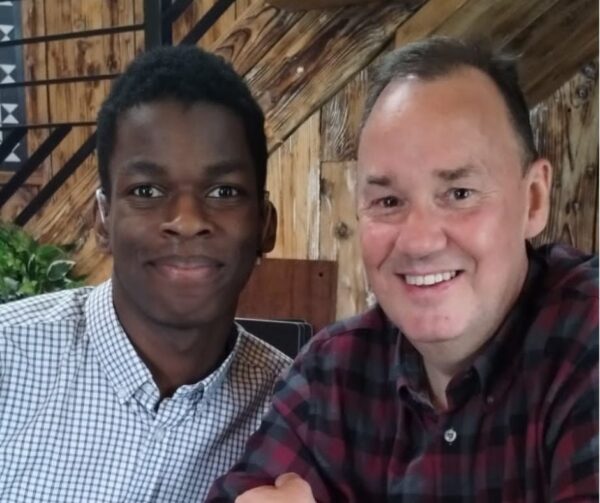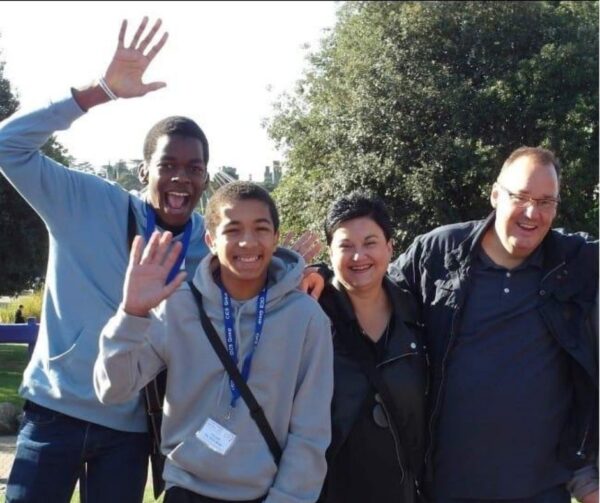They say turning 18 marks the beginning of adulthood, a time filled with newfound freedom and exciting possibilities. But for the thousands of teens in care across England, reaching this milestone can be a scary time, because it’s when their foster care comes to an end. What a lot of people don’t know, is that there is a little-known lifeline, called Shared Lives, that is ready and waiting to help young care leavers. We spoke to foster carers turned Shared Lives carers, Adele and Alan, about their experience.
Adele and Alan had been foster parents since 2010 when they found themselves at a crossroads with foster son Barney, who had lived with them for nine years in a long-term placement. Barney is Deaf and neurodivergent. As he approached the legal age of adulthood, the fear of uncertainty loomed large, and Adele, like many foster mums, felt the weight of the transition.

Adele said: ‘We were desperately looking for something and even though we’d fostered for so long, we’d never heard of Shared Lives. It was only when another foster carer told us about Shared Lives that we started to look into it.’
This word of mouth through a fellow foster carer turned out to be a complete game changer for Adele and Barney’s situation – and with over 12,000 teens who aged out of the foster system as care leavers in 2023, its one that many foster carers are facing today.
What is Shared Lives?
Shared Lives is a bit like fostering but the big difference is that it’s for adults with support needs. PSS Shared Lives carers are self-employed and welcomed into a supportive network of Shared Lives carers across the UK – that includes regular meetings and socials that bring Shared Lives carers together where they can grow their support network and swap knowledge.
‘Shared Lives is a bit like fostering but the big difference is that it’s for adults with support needs.’
PSS invented Shared Lives in 1978, but despite it being the safest and best form of care according to the Care Quality Commission (CQC), it still only accounts for 1% of the social care sector. This means that it’s often an underused alternative to residential homes or supported living. Unlike other forms of care like these, Shared Lives provides a continuation of care that also keeps families together.
The average age for moving out of the parents’ home in the UK is 23 years old. But when it comes foster care, you’re considered a care leaver at 18 and encouraged to move out into a place of your own. As soon as Barney turned 16, it became clear that his individual support needs meant living alone wasn’t an option yet.
Adele said: ‘Everyone was saying to Barney how he’s going to be an adult – and he was scared. Not everyone fits that model of wanting to become completely independent at 18.’
Staying put
Staying Put means that when a looked-after child becomes a ‘care leaver’ at 18, they can stay living with their foster carer. A staying put arrangement is not the same as a foster placement and it’s not regulated by fostering services. With staying put arrangements, foster carers change status to become a ‘former foster carer’.
According to The Fostering Network, ‘Many fostering services reduce the allowance given to foster carers once the young person reaches the age of 18 with the intention that the shortfall is made up from the young person claiming housing benefits. In addition, the loss of income from fostering fees can be a major barrier to offering a post-18 arrangement.’
Adele said: ‘People don’t like to talk about this, but fostering is our job. And there’s that whole stigma around all of that.’

The moment things changed
Adele and Alan did some online research that led her to PSS’s website. They got in touch with PSS to learn more about Shared Lives.
Adele said: ‘We spoke to someone called Jona, and she was amazing. She was very clear on what it would be like and she totally got why I was phoning two years before he was turning 18. I just needed that reassurance and to know what it would look like for us.’
Adele learned that Shared Lives carers can earn a fee just like foster carers do. For Adele and Alan’s personal situation they’d receive a small increase in what they’d earned as foster carers.

Making the process simpler
With PSS you’ll get the support you need every step of the way. Everything started to become clearer for Adele, Alan and Barney as Jona guided them through the process to becoming a Shared Lives arrangement. Both Adele and Alan had to apply to become a carer, and there were some additional training courses that they had to complete, too.
As far as home life is concerned, it looked no different for Adele, Alan, Barney, or Barney’s brother Tate, who they continued to foster while Barney made the transition to Shared Lives. In fact, with the continued support from Adele and her family, Barney’s not just reached big milestones; he’s shattered expectations. His most recent success includes landing a paid apprenticeship with his local council.
By becoming a self-employed Shared Lives carer for Barney it meant he didn’t have to deal with the dreaded ‘care cliff’ at 18. He could grow and develop into his independence at a pace that’s right for him. To top it off, he could stay with Adele and Alan because they were financially stable enough to do the role they love.
Breaking barriers: Shared Lives and fostering services
Shared Lives providers and foster services can work together to give care leavers the best chance for success as an adult. Often, Shared Lives carers can still carry on as foster carers too just like Adele and Alan do for Barney’s brother, Tate. Tate is also deaf and at 16 they’re just about the start the Shared Lives process for him too. Shared Lives isn’t a replacement to foster care, but it is an alternative that foster carers can consider before the young adults they have loved and cared for leave the nest.
There’s more than one way to support young adults in their transition from children’s to adult’s social care. Shared Lives is one of them. If your foster child has supported needs and is about to turn 18, why not request a call back from our friendly team? We’ll be happy to tell you more about how Shared Lives might be able to help.